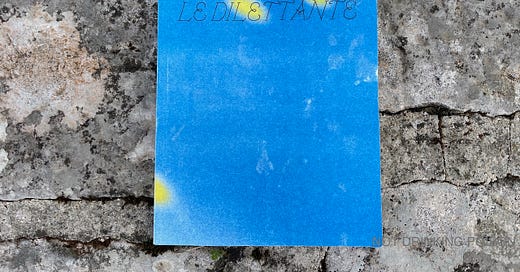Jacques Néauport, Le Dilettante
A review of Hélène Bertin & César Chevalier's 2021 book of interviews with the reclusive natural winemaking legend.
For any foray into the field of specialized, often self-published French natural wine literature, it’s good to roll up your pant cuffs. To Americans raised with some awareness of US editorial norms - the dwindling population to which I belong - the realm of small-scale French publishing can itself seem a very muddled place. When paired with a subject like natural wine, which even at its most empirical borders on the esoteric, the results can be off-puttingly kooky.
I recall recoiling, aghast, when in the course of reading the introduction to Jules Chauvet, ou le talent du vin (Editions Jean-Paul Rocher, 1997), I arrived at the embarrassingly extended citation of Kermit Lynch’s famous portrait of the Beaujolais négociant and wine scientist Jules Chauvet in his 1988 book Adventures on the Wine Route.1 Poor Chauvet was also the subject of an ill-conceived work of aimless hagiography by one Jean Camille Goy (Jules Chauvet, l’homme du vin perdu, Editions Jean-Paul Rocher, 2002). In light of such slapdash editorial work, and well-intentioned but rather cracked manifestos like former Beaujolais winemaker Denny Baldin’s Super Natural Wine (self-published, 2014), it can seem remarkable any credibility whatsoever remains in the subject of natural wine today.
Jacques Néauport, le dilettante, a 2021 collection of phone interviews with the eponymous natural winemaking consultant organized and transcribed by artists Hélène Bertin and César Chevalier, represents the upswing to the abiding low-budget amateurism of small-scale French publishing. For natural wine lovers, the book is a primary source document that presents Néauport at length in his own words, replete with bouts of repetition, dissembling, and myth-making.
In the course of seven edited phone interviews, Bertin and Chevalier solicit Néauport’s views on many aspects of wine history and modern wine production. If this approach obliges their subject to give responses that at times veer into Wikipedia territory, it remains worthwhile for how it unites, in one place, a comprehensive set of frank, professional takes on issues upon which conventional wine education generally adopts the industry position.
On clonal vine selection:



